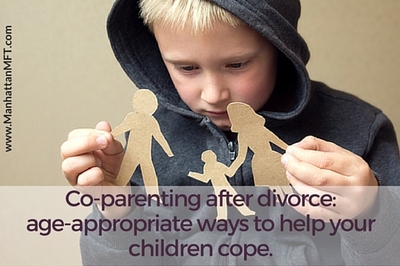Here is what you can expect from children of different ages during divorce, and how you as parents can support them through this difficult experience.
Children ages 6-8: They may openly grieve the loss of the family as they know it. It may mean grieving for the parent that moved out of the home. Grieving for children this age can look like sadness, anger or general crabbiness. They are still “magical” thinkers and they may create interesting tales stemming from their yearning for reconciliation. They are fearful about being replaced, particularly if a parent is too busy, has remarried or has new children. They are fearful of losing their primary parent. The logic for them is that if they can lose one parent, they could lose the other parent somehow. Children this age may regress into earlier behaviors such as bed-wetting, nail biting, baby talk, or playing with an old toy. They are looking for safety and familiarity. Children this age may be vulnerable to physical signs of stress such as headaches, stomach problems or sleep distributes. What Can Parents Do:
Children 9-12 years old They may have strong feelings about divorce but they often try to hide them or pretend they don’t care. They have a tendency to blame one parent or choose sides. They will be protective of the parent they think has been wronged. They will often express a great deal of anger. Children this age may be vulnerable to physical signs of stress such as headaches, stomach problems or sleep distributes. School performance may suffers they may be moody and distracted. What Can Parents Do:
Children 13-17 Years old Divorce may interfere with (delay or speed up) the need to separate from family. They may seek outside sources for support or reassurance to avoid family problems. Anger often leads to depression or risky behaviors when not dealt with or avoided. A parent not in their life as often does matter- no matter what they say. New intense relationships may be a way to avoid what is happening at home. Parents’ dating may be difficult for teens to watch as it finalizes the end of the family as they knew it. They may worry about the future, who will pay for what, when things will happen, and how they should help. What Can Parents Do:
10 common post-divorce behaviors that are harmful to children:
Manhattan Marriage and Family Therapy is pleased to offer co-parenting counseling to divorced and separated couples. For more information, please call 917-510-6422 or e-mail [email protected].
|
Categories
All
Archives
March 2023
|
[email protected]




 RSS Feed
RSS Feed